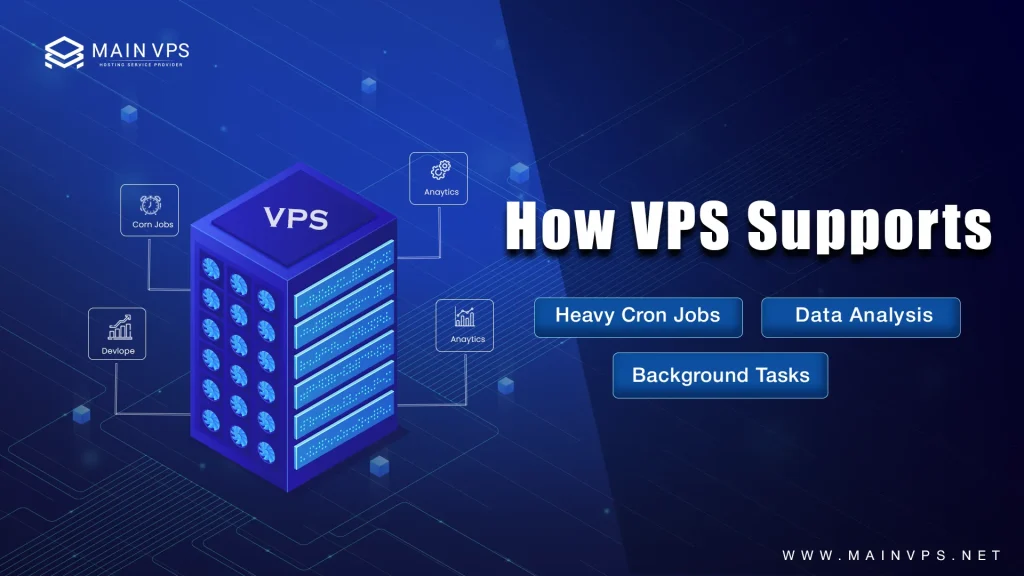
In contrast to shared hosting, where resources are limited, a VPS comes with a more advanced fixed resource model that is reserved just for the user and comes with the ability to modify the system structures in place which helps aid complex automation (cron jobs) workflows requiring maximum security and efficiency.
1. Why Developers Choose VPS for Heavy Cron Jobs
- Dedicated Resources: No noisy neighbors—your cron jobs run on reserved CPU and memory.
- Persistent Environment: Cron tasks execute reliably, even if they take long or need reboot protection.
- Customizable Runtime: Install heavy libraries (Python, R, Java, Node.js) needed for complex scripts.
- Root-Level Control: Schedule tasks, tweak limits, and set environment variables your way.
2. Typical Developer Use Cases
- Data ETL Pipelines: Extract, transform, load tasks that crunch logs, CSVs, or databases overnight.
- Machine Learning & Statistics: Run training jobs, model evaluations, or bulk predictions.
- Automated Reports: Generate PDFs or Excel files from data sources every hour or day.
- Media Encoding: Convert videos, resize images, or process large media batches via cron.
- Log Aggregation & Backup: Save disk space and manage archives using background scripts.
3. Choosing VPS Specs for Heavy Cron Workloads
| Workload Type | RAM | CPU | Storage | Notes |
|---|---|---|---|---|
| Small Scripts | 2–4 GB | 1–2 cores | 40 GB SSD | Suitable for lightweight tasks |
| Data Processing / ML | 8–16 GB | 2–4 cores | 100+ GB NVMe, daily backups | Supports Python/R libraries and cron jobs |
| Heavy Encoding or ETL | 16+ GB | 4+ cores | NVMe SSD, RAID storage | Handles video/media and large datasets |
4. Best Practices to optimize VPS for Cron Job Performance
- Use time-based triggers: e.g., run jobs when disk and CPU usage is low.
- Prioritize tasks: Use
niceto lower priority, so your main apps aren’t slowed:
bashnice -n 15 python process_data.py - Log with timestamps: Maintain healthy monitoring and debugging:
bash/usr/bin/python /opt/etl.py >> /var/log/etl.log 2>&1 - Avoid duplicates: Add lock files in your script to prevent overlap.
- Monitor resources: Utilize tools like
htop,top, orglancesin real-time.
5. Advanced VPS Setup Tips
- Use systemd timers instead of cron for better cleanup and logging.
- Containerize long jobs with Docker to keep dependencies isolated.
- Set up remote logging with syslog/Graylog for centralized cron logs.
- Schedule resource-intensive tasks with CPU scaling to avoid bottlenecks.
6. Scaling Your VPS Environment
- Vertical Scaling: Increase CPU and RAM as your job sizes grow.
- Horizontal Setup: Run cron tasks across multiple VPS or worker nodes for parallel processing.
- Autoscaling with Cloud API: Dynamically spin up new VPS instances on demand for burst jobs.
Final Take
For automation use cases, especially in data analysis or video processing, a VPS is an excellent choice. It provides consistent performance, gives complete access and control, and ensures smooth operation of background scripts, data workflows, as well as seamless execution of cron jobs.
Need help finding the right setup or optimizing your cron workloads? MainVPS offers tailored guidance, resource planning, and VPS options fit for developer-heavy automation.
Testimonial:
“I moved my nightly ETL to a MainVPS 8 GB plan with root access, and my processing time halved—without touching my web services.”
— Ankit S., Data Engineer
Got Questions?
- What RAM/CPU suits Python ETL? |
Start with 4–8 GB and adjust based on memory profiling. - Can VPS handle Docker-based cron jobs?
Yes—Docker runs cleanly, as long as CPU/RAM are reserved. - Is systemd timer better than cron?
For logging and restart handlers, yes! - How do backups affect job timing?
Schedule cron after backup windows to avoid I/O congestion.
Start automating smarter with a reliable, developer-focused affordable VPS hosting today!




